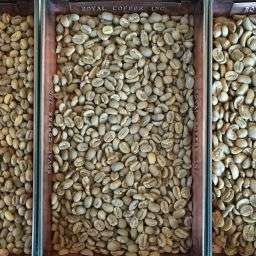
Specialty coffee transcends the ordinary, offering a culinary experience marked by its superior quality and nuanced flavor profiles. Unlike regular coffee, which might prioritize quantity and cost-effectiveness, specialty coffee is the result of meticulous cultivation, processing, and roasting practices.
The Specialty Coffee Association (SCA) plays a pivotal role in this distinction, setting a grading scale where coffee must score above 80 out of 100 to earn the “specialty” title. This grading scale is a comprehensive sensory overview of the coffee’s quality, including its aroma, flavor, aftertaste, acidity, body, uniformity, balance, and overall impression.
Arabica vs. Robusta: Characteristics and Flavor Profiles
The coffee world is predominantly divided into two species: Arabica and Robusta. Arabica beans are celebrated for their complex, nuanced flavors, often featuring hints of fruit, sugar, and high acidity levels. They are the hallmark of specialty coffee due to their refined taste and aromatic qualities. Robusta beans, on the other hand, are known for their robust flavor, higher caffeine content, and generally harsher taste.
They are commonly found in espresso blends for their ability to produce a better crema and add body to the coffee. The preference for Arabica beans in specialty coffee is not only due to their superior flavor profile but also because they are grown at higher elevations, which contributes to the complexity of their taste.
Impact of Roast Levels on Flavor
Roasting is a transformative process that unlocks the flavor potential of coffee beans. The roast level, ranging from light to dark, significantly influences the coffee’s final taste. Light roasts are known for preserving the bean’s original flavor, highlighting its acidity and allowing its natural characteristics to shine.
Medium roasts offer a balance, reducing acidity while introducing more body and sweetness. Medium-dark roasts begin to show a richer body and darker flavors, with some oil on the bean’s surface. Dark roasts are characterized by a pronounced oiliness and a bold, smoky flavor, often with notes of chocolate or caramel, albeit at the expense of the bean’s inherent flavors.
Roast Type and Caffeine Content
Contrary to popular belief, the roast level affects not just the flavor but also the perceived caffeine content. Light roasts, with their denser beans, actually retain more caffeine than their darker counterparts. However, the difference in caffeine content is relatively small and often overshadowed by the roast’s impact on flavor.
Darker roasts offer a fuller body and smoother bitterness, making them popular for those who prefer a strong, robust cup of coffee. The art of roasting, therefore, is not just about achieving a desired flavor profile but also about maintaining the delicate balance between acidity, body, and caffeine.
Considerations in Selection
Choosing specialty coffee beans involves several critical factors: origin, roast type, and freshness. The origin of the beans can significantly influence their flavor profile, with different regions offering distinct taste notes, such as fruity, floral, or nutty.
Roast type, from light to dark, affects the bean’s flavor and acidity, with lighter roasts typically preserving more of the bean’s original character and darker roasts emphasizing richer, bolder flavors. Freshness is paramount in specialty coffee; freshly roasted beans will offer the most vibrant flavors and aromas.
Single Origin vs. Blends
Single origin coffees, sourced from a specific farm or region, offer unique flavors and are valued for their traceability and the ability to experience the distinct characteristics of their specific locale. Blends, meanwhile, are crafted by combining beans from various origins, aiming to create a balanced and consistent flavor profile.
While single origins can provide a more nuanced and complex cup, blends are designed for those seeking consistency and a specific flavor note year-round.
Online vs. Local Coffee Shops
Purchasing specialty coffee beans can be done either online or at local coffee shops, each offering unique benefits. Online stores provide access to a vast selection of beans from around the world, often with detailed information about the beans’ origin, roast date, and flavor notes.
This convenience and variety make it an attractive option for many. Local coffee shops, on the other hand, offer the advantage of personal interaction, allowing customers to ask questions, receive recommendations, and sometimes even sample before buying. Supporting local businesses also contributes to the community’s economy.
Subscription Services
Subscription services for specialty coffee have gained popularity, offering convenience and a way to discover new coffees. These services curate selections based on personal preferences and deliver them regularly to your doorstep. Subscribers benefit from a continuous supply of fresh beans and the opportunity to explore a wide range of flavors and origins without the need to order each time.
Maintaining Freshness and Flavor
Proper storage is crucial to preserving the freshness and flavor of specialty coffee beans. The best practices include keeping the beans in an airtight container away from direct sunlight, heat, and moisture.
It’s recommended to store coffee beans at room temperature and consume them within a month of roasting to enjoy their peak flavor. Avoid refrigerating or freezing the beans, as these environments can introduce moisture and lead to flavor degradation.
The Role of Coffee Roasters
Specialty coffee roasters play a pivotal role in the coffee industry, serving as the bridge between the coffee farmers and the final consumer. Their craft involves not just roasting coffee beans but selecting the highest quality beans with the most potential for exceptional flavor profiles.
Roasters apply their expertise to develop roasting profiles that highlight the unique characteristics of each bean, ensuring that the end product delivers the best possible taste experience.
Bean Selection and Blend Crafting
Selecting beans for specialty coffee involves a meticulous process where roasters often sample and evaluate numerous varieties before choosing the ones that meet their stringent standards for quality and flavor. Once selected, roasters experiment with different roasting times and temperatures to find the perfect balance that brings out the beans’ inherent qualities.
Crafting unique blends involves combining different single-origin beans in precise ratios to achieve a consistent and harmonious flavor profile, appealing to a variety of palates.
Ethical Sourcing and Community Impact
The specialty coffee industry places a strong emphasis on ethically sourced beans, recognizing the significant impact that sourcing practices have on coffee farming communities. Ethical sourcing involves fair compensation for farmers, supporting sustainable farming practices, and often direct trade relationships that ensure more of the profits go directly to the producers. This approach not only improves the livelihoods of coffee growers but also contributes to the production of higher quality coffee beans.
Supporting Sustainability
Specialty coffee supports sustainability and ethical practices by promoting shade-grown coffees, organic farming, and biodiversity. Roasters and consumers alike are increasingly valuing coffee that is not only exceptional in taste but also responsible in its production, minimizing environmental impact and ensuring the health and well-being of farming communities. This commitment to sustainability is integral to the ethos of the specialty coffee industry, reflecting a dedication to quality, ethics, and environmental stewardship.
FAQs
- Best Places to Buy Specialty Coffee Beans: Specialty coffee beans can be purchased from reputable online retailers, local specialty coffee shops, and directly from roasters. Each avenue offers a different experience, from the convenience and variety of online shopping to the personal touch of local coffee shops.
- How to Store Coffee Beans: To maintain freshness and flavor, store coffee beans in an airtight container at room temperature, away from direct sunlight, heat, and moisture. Avoid refrigeration or freezing to prevent condensation and flavor loss.
- Difference Between Arabica and Robusta Beans: Arabica beans are known for their smooth, complex flavor profiles with higher acidity, while Robusta beans are more robust and bitter, with a higher caffeine content. Specialty coffee predominantly uses Arabica beans for their superior taste.
Conclusion
The journey through the world of specialty coffee reveals a deep commitment to quality, from the meticulous selection of beans to the craft of roasting, and a strong emphasis on sustainability and ethical practices. Choosing high-quality specialty coffee beans not only elevates the coffee experience but also supports a global chain of ethical and sustainable coffee production.
This commitment ensures that each cup of coffee not only tastes exceptional but also contributes positively to the communities and environments where coffee is grown.









